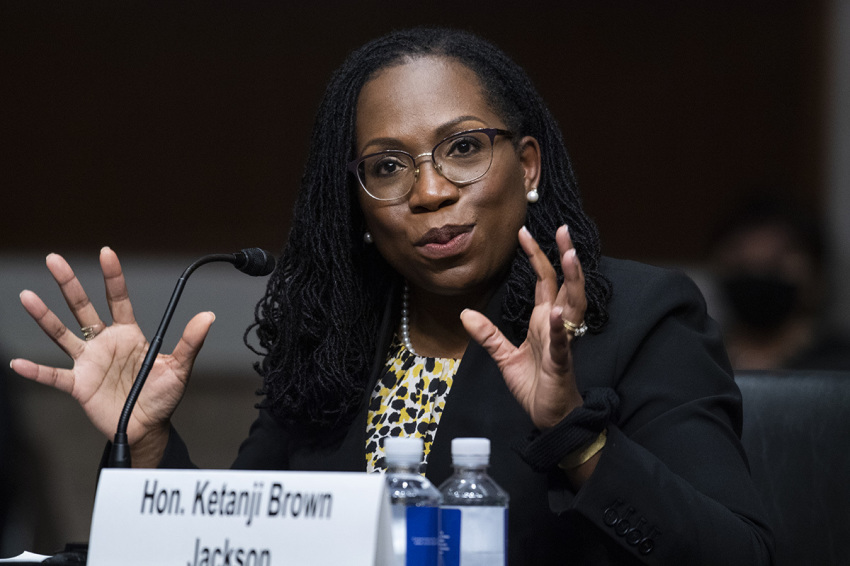Ketanji Brown Jackson's membership in Harvard BSA that hosted anti-Semitic speaker surfaces ahead of hearings

Supreme Court nominee Judge Ketanji Brown Jackson's membership in a Harvard University student group that once invited a controversial anti-Semitic speaker to campus has surfaced ahead of her confirmation hearings later this month.
In 1992, Jackson was a member of the Harvard Black Students Association when they invited Leonard Jeffries, a professor known for making anti-Semitic remarks, to speak at the university, Fox News reports.
According to the Anti-Defamation League, Jeffries first gained public attention in 1991, “when the New York Post published an account of a vitriolic anti-Semitic and racist speech he made on July 20 at the Empire State Black Arts and Cultural Festival in Albany, New York.”
“Jeffries asserted that ‘rich Jews’ controlled the black slave trade, and that Hollywood was the site of a Jewish-dominated conspiracy to systematically denigrate blacks,” noted ADL.
“He called then-Assistant U.S. Secretary of Education Diane Ravitch the ‘ultimate, supreme, sophisticated, debonair racist’ and a ‘Texas Jew.’”
The Harvard chapters of the Jewish group Hillel, the Gay-Straight Alliance, and the College Democrats protested the BSA event featuring Jeffries, with many professors and students also criticizing the speech, according to a 1992 Harvard Crimson article obtained by Fox News.
Fox News acknowledged that while Jackson was listed as a member of Harvard BSA when Jeffries spoke, it was not clear as to whether she attended the speech or if she denounced it.
The Christian Post reached out to the White House Press Office seeking comment for this story. A response was not received by press time.
The Republican National Committee posted a “Rapid Response” entry on its website expressing concern over the claims about Jackson and the controversial speaker.
The RNC asked multiple questions in the entry, among them if she attended the speech, if she was “involved in its planning,” if she paid dues or gave “any other financial support to the organization,” if she had been “concerned about Jeffries being invited to campus,” does she agree with his anti-Semitic views, and if she does not, “will she denounce them?”
“She was a member of the organization — an organization that ‘applauded’ Jeffries speech — but there is no record of her condemning the event,” stated the RNC. “The American people deserve answers.”
Jackson is not the first Supreme Court nominee to face questions about college activities. In 2017, then-Supreme Court nominee Neil Gorsuch was accused of having founded a “Fascism Forever” student club while enrolled at Georgetown Preparatory School, an elite private boarding school affiliated with the Roman Catholic Jesuits located in the Washington, D.C., area.
A report by the Jesuit publication America Magazine, however, clarified that while a yearbook entry said that Gorsuch had founded such a club, the entry was actually a joke by Gorsuch in reference to him being more conservative than most of his peers.
Biden nominated Jackson, who serves as a Judge on the U.S. Court of Appeals for the District of Columbia Circuit, to replace retiring Supreme Court Justice Stephen Breyer last month. If confirmed, Jackson would become the first African American woman appointed to the court. Jackson would become the first Supreme Court Justice appointed by Biden since he took office last year, joining two Supreme Court justices appointed by Democratic presidents and six justices appointed by Republican presidents.
Last week, Sen. Dick Durbin, D-Ill., the chair of the U.S. Senate Judiciary Committee that will consider Jackson’s nomination, announced in a letter to colleagues that confirmation hearings for the federal judge will take place from March 21–24. During the confirmation hearings, members of the Senate Judiciary Committee will have the opportunity to ask Jackson questions about her legal philosophy. Senators will also hear testimony from witnesses arguing for and against her confirmation.
When the confirmation hearings conclude, the Senate Judiciary Committee will vote on whether to advance Jackson’s nomination to the full Senate. The Senate Judiciary Committee consists of 11 Democrats and 11 Republicans, reflecting the 50-50 split between the parties in the U.S. Senate.
If the nomination makes it to the full Senate, Jackson only needs to secure the support of a simple majority of senators for confirmation. Jackson is expected to be confirmed to the Supreme Court in light of the Democrats’ majority in the Senate, with Vice President Kamala Harris casting the tie-breaking vote in favor of the Democrats, as well as the fact that some Republican senators have indicated a willingness to consider voting for her.



























